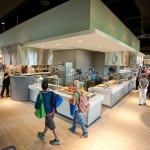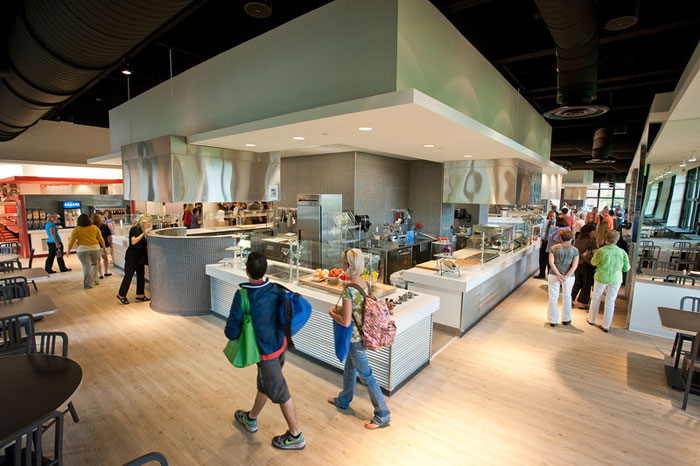 Hello again! I’m excited for this week’s topic. Not only do I work for Recycling Coordinator Amy Kadrie, but I also work on Team Green for Director of Campus Dining Cam Schauf. Team Green is a small group of interns that work with Cam to make all aspects of dining as sustainable as we can. That being said, I’m going to focus this post on how you can eat green on campus. A shout out to incoming freshman – to find out more about sustainable dining, visit the Green Orientation event on Wednesday, August 29!
Hello again! I’m excited for this week’s topic. Not only do I work for Recycling Coordinator Amy Kadrie, but I also work on Team Green for Director of Campus Dining Cam Schauf. Team Green is a small group of interns that work with Cam to make all aspects of dining as sustainable as we can. That being said, I’m going to focus this post on how you can eat green on campus. A shout out to incoming freshman – to find out more about sustainable dining, visit the Green Orientation event on Wednesday, August 29!
Reusing
– First off, it’s no secret that plastic harms the environment in more ways than one. Forget disposable water bottles and invest in a reusable one. There are plenty of green options available in the bookstore, such as stainless steel and BPA-free plastic. You can then take advantage of the water bottle refill stations that are all over campus, and our newer water fountains that count how many plastic bottles have been saved through its use.
– On a similar note, Dining offers an excellent clamshell reuse program. Essentially, you purchase a reusable food container for 5 dollars, or a bonus meal, from any cashier at any dining location. You can even use your meal plan money to buy it. Then, you use the clamshell like a Tupperware container, loading it up with food for on the go enjoyment. When you’re all done, bring back your dirty clamshell to any dining location. There are deposit locations all around campus, or you can simply hand it to a cashier. Then, pick up a clean one when you need it next. That’s right: you never have to wash it yourself! These clamshells downsize the amount of food waste and packaging greatly, and are really convenient for students’ lifestyles.
– Both Danforth and Douglass are designed to have all reusable plates, cups, and utensils, which greatly minimizes waste.
Composting
– The University is continuing to expand its composting program with Waste Management. It is relatively new, but steadily growing to encompass more locations. For the past year Danforth has been composting both pre- and post-consumer goods, such as food scraps, napkins, paper plates, and paper towels through their food pulper (see this article for more details). All locations will be collecting pre-consumer material this fall, even the coffee shops- leftover coffee grounds is one of the best materials to compost! Additionally, Douglass will begin to compost post-consumer waste this fall.
Vegetarian and Local Fare
– The University provides as many vegetarian options as possible. Danforth typically has a vegan station for all meals as well as other vegan and/or vegetarian options at other stations. Wilson Commons, The Meliora, Southside Market, and Hillside Market all offer rotating vegetarian and vegan options. Coffee shops accommodate your needs by offering soy milk for beverages and sometimes vegetarian/vegan snacks.
– Over 30% of the food purchased for dining halls is local, meaning it comes from within New York State.
Special Events
– Meatless Monday, a national campaign to address the environmental and health impacts of high meat consumption, is held in both Douglass and Wilson Commons every Monday for dinner. The menu consists of only one meat option while all other stations are completely vegetarian and/or vegan in Douglass. In Wilson Commons, the Healthy Grill station is vegetarian and/or vegan for this event. Groups who sponsor this event, including Team Green and others, table during the meal and conduct surveys and answering any questions you may have.
– Local Foods Week takes place once each semester. Several dining locations participate in events and meals that feature local foods – some events are even 100% local!
– Zero-Waste meals are to be held periodically throughout the school year. These meals strive to produce absolutely no waste, which applies to every aspect of the meal, even including the packaging that foods arrive in. Food waste is composted, and a representative of Waste Management is present to discuss the composting process and address questions. No disposable utensils or plate ware are used at these events.
To keep up with Dining’s sustainable efforts, watch out for newsletters via email and the Weekly Buzz, and follow U of R Dining on Facebook.
By Melissa Kullman, Class of 2014


“First off, it’s no secret that plastic harms the environment in more ways than one”
–> I would be interested in references to the scientific literature that demonstrate this. A case can be made that plastic has been one of the most incredible inventions for the advancement of human health and well-being.
“There are plenty of green options available in the bookstore, such as stainless steel and BPA-free plastic”
–> here is what the FDA says, along with dozens of research findings on the harm of BPA: http://www.fda.gov/NewsEvents/PublicHealthFocus/ucm197739.htm
Here is one from the Center for Disease Control: http://www.cdc.gov/exposurereport/data_tables/BisphenolA_ChemicalInformation.html
All of the recent studies, government funded, find BPA unlikely to cause poor health effects because our bodies efficiently metabolize and eliminate it. Hilariously, in one of the studies the E.P.A. conducted a study that had people EAT (yes, eat) massive quantities of BPA for a 24 hour period and still found levels of BPA in blood and urine “too low for detection” in the subjects.